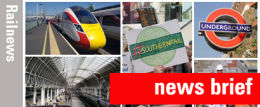Posted 26th February 2021 | 2 Comments
Rail minister challenges industry to cut costs

THE government has challenged the rail industry to pioneer new ways of working and to halve the time and reduce the cost of completing infrastructure projects, with the launch of the next stage of Rail Project SPEED.
In a speech at the Project SPEED conference today, hosted by the Rail Industry Association, rail minister Chris Heaton-Harris invited the 1,800-strong virtual audience to adopt the new approach to become ‘faster, smarter and more efficient’ in the way that projects are managed.
Rail Project SPEED (Swift, Pragmatic and Efficient Enhancement Delivery) was jointly developed by the Department for Transport and Network Rail last summer. Infrastructure projects at different stages of development have been reviewed to identify how Government funding could go further and how work could be carried out faster.
This approach identified 10 key themes to lower costs and speed up the delivery of infrastructure schemes, such as rapidly increasing the use of ‘innovative construction methods’ and simplifying planning processes.
The Department for Transport said one project already benefiting from Project SPEED principles is the scheme to reopen the former Northumberland line between Ashington and Newcastle.
The DfT added that Northumberland County Council, the DfT, Network Rail, and AECOM have collectively worked to identify opportunities to bring this into service as quickly as possible. ‘This could take months off the schedule and deliver efficiencies which save millions from the programme.’
Mr Heaton-Harris said: ‘The whole country has relied on the transport industry over the past year, to keep the country moving, supplies delivered and key workers to their jobs saving lives. We are now depending on transport to kickstart our economic recovery.’
Reader Comments:
Views expressed in submitted comments are that of the author, and not necessarily shared by Railnews.

Neil Palmer, Waterloo
If the DfT are truly looking for ‘faster, smarter and more efficient’ then how about starting with NOT making boneheaded decisions like NOT electrifying East-West Rail when it is built? A new line that will connect the electrified East Coast, Midland & West Coast main lines lines (and sooner or later an electrified Oxford) without electrification is an incomprehensibly ridiculous decision. We all know it will be electrified eventually, at a much higher cost in money & disruption than if done now. The DfT is probably the single biggest cause of cost escalation in rail projects with brilliant decisions like that. Hydrogen power or bionic duckweed? Hah! Read the recent Belgian study into full electrification, battery & hydrogen power that determined electrification is the way to go.
Also, where's the continuing electrification work for the skilled and experienced teams that were assembled for the latest tranche of work? Again DfT (and government) to blame for that. We'll see the teams broken up from lack of work, then reassembled and retrained later (again!) at an additional cost that will be added to the next electrification project.
You would think they would have learned by now. It's almost like it is intentional so they can claim electrification costs are too high.
david c smith, Bletchley
The only real way to get maximum benefit for minimum cost is when the personnel concerned are appropriately motivated, especially those who make the decisions.
Politicians may put political aims first, whilst innovation may not be the strong point for many others.
It may well be that the best role for central government ,( politicians and civil servants) , is to encourage innovation through applying appropriate motivation , through subsidies and charges which reflect "hidden" benefits and costs, rather than trying to control / run the railway themselves.